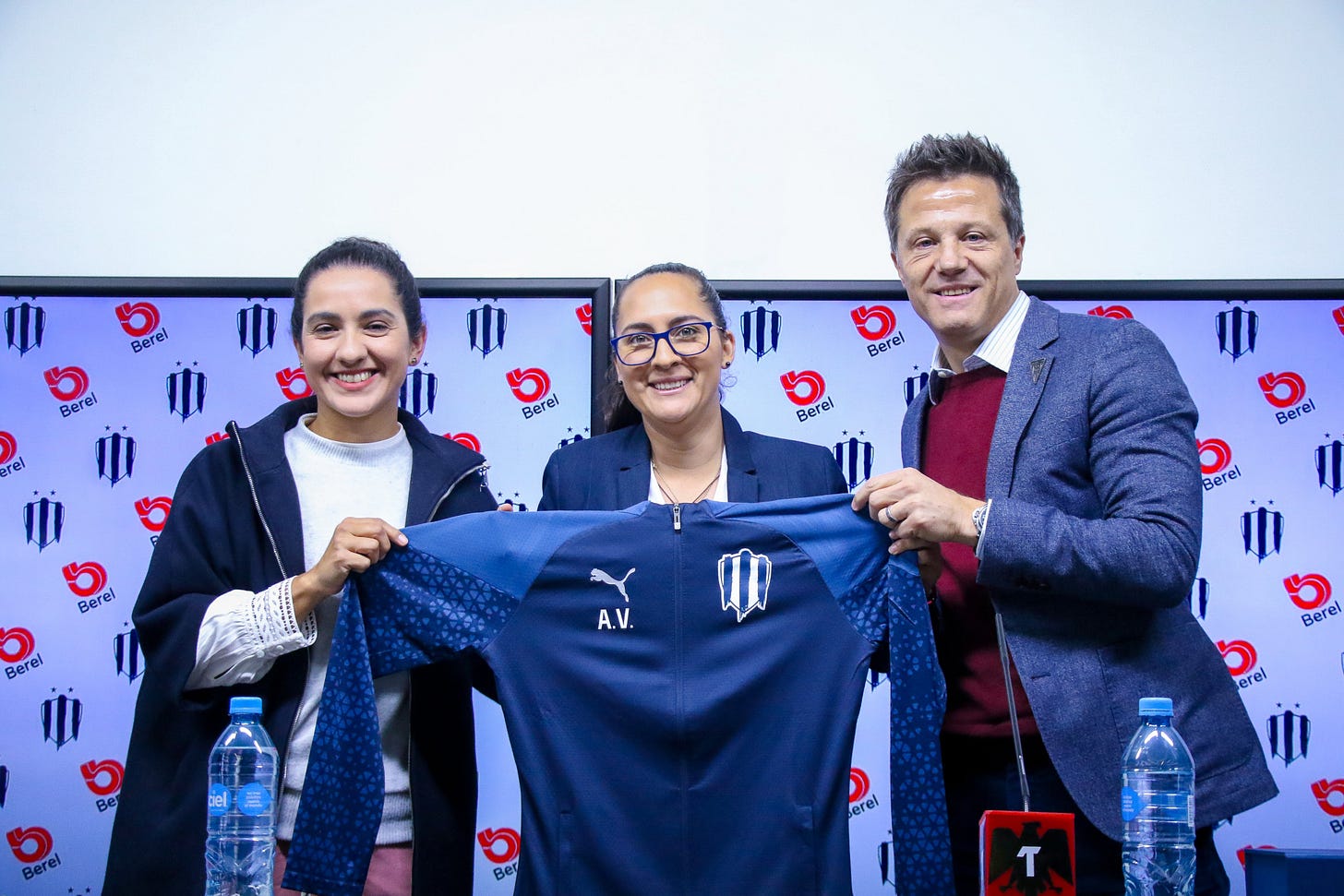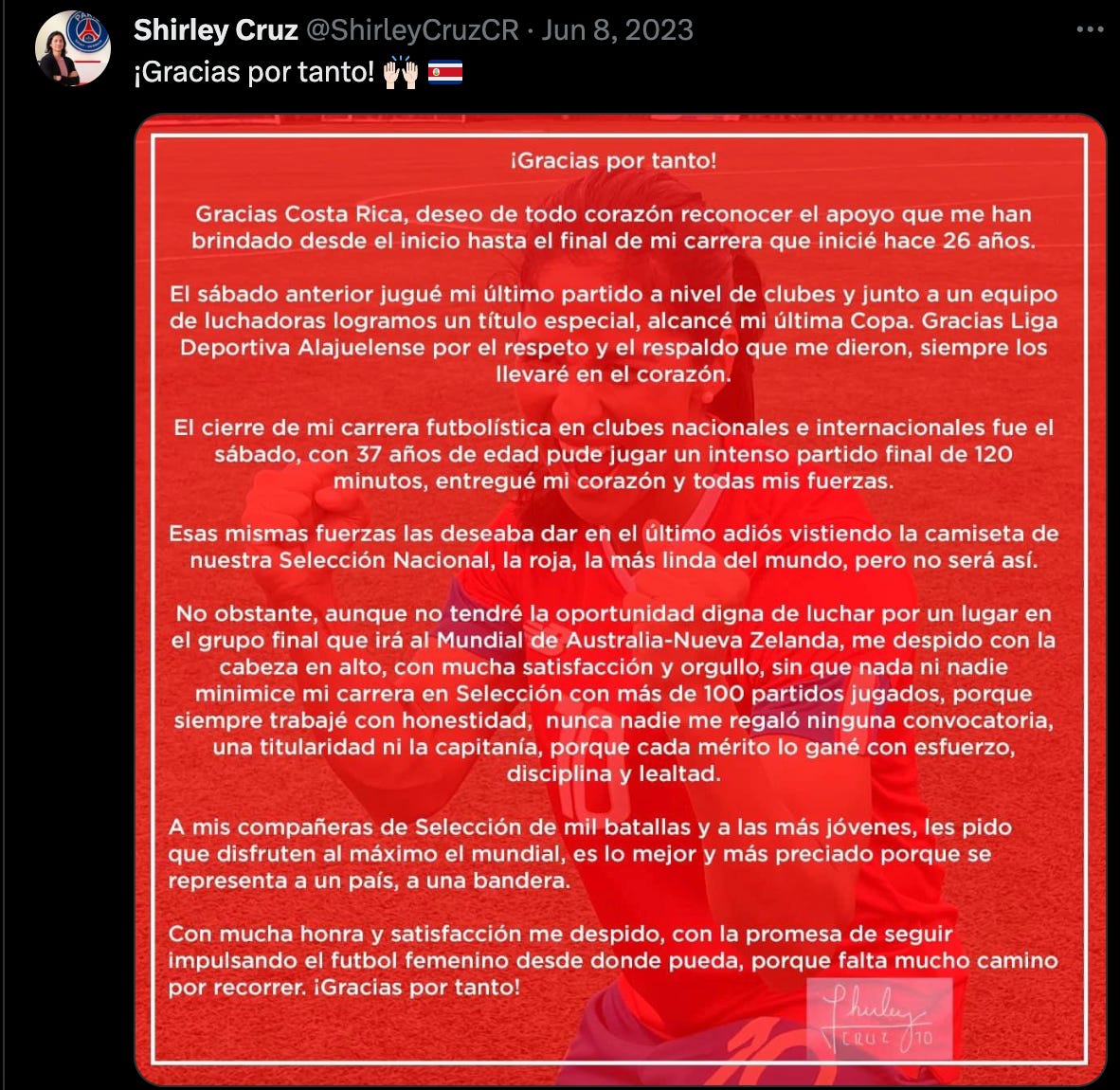A new beginning for Rayadas, Valverde, and another international-to-club coaching spotlight
All eyes are on Amelia Valverde, and LigaMX Femenil, as the former Costa Rica manager takes over from Eva Espejo in Monterrey.
“Eva, today is the beginning, not the end of a dream.”
Not my words, but the words of Club de Fútbol Monterrey Femenil.
In November 2023, the two-time LigaMX Femenil champions etched that touching sentiment in an official statement announcing Eva Espejo’s shift from being head coach to sporting director of the club.
In place of Espejo comes Amelia Valverde. The 36-year-old from San Ramón, Costa Rica, joined Rayadas after 8 years as the manager of her country’s women’s national team.
With the new LigaMX Femenil Clausura season getting underway on Friday night (5th January 2024), it’s a good time to look at the changing of the guard and what it means.

What legacy did Espejo leave behind?
Although Monterrey had already established itself as a dominant force in the Mexican game before Espejo’s arrival, she still had to carry the mantle of excellence. And carry she did.
Espejo enjoyed two and a half very successful seasons as head coach in Monterrey; with the highlight being winning the 2021 Apertura title (the club’s second league trophy) via a penalty shootout in their fierce local rivals UANL Tigres’ back garden.
At home in the first leg of the Gran Final, Rayadas threw away a one-goal lead, and then a 2-1 lead, to eventually draw 2-2 with Tigres. Even though that result doesn’t sound disastrous on its own, UANL had a perfect record at home that season. 11 wins from 11 matches, with 46 goals scored and just four conceded.
Espejo would need to work her magic at the Estadio Universitario to avoid defeat and have any chance of claiming the title. With a chippy and bullish game plan, Rayadas frustrated the hosts in front of a sell-out crowd of 42,000 fans.
Against all odds, goalkeeper Alejandría Godínez - with brick wall defensive duo Rebeca Bernal and Mariana Cadena in front of her - blocked and smothered everything Tigres could throw at Rayadas, and the match finished 0-0. The final was to be settled on a penalty shootout.
Eventually, the raucous yellow and blue-clad spectators watched in disbelief as goalkeeper Godínez saved twice to seal the win for Rayadas and Espejo.
Tigres’ Maria Sanchez - who was subbed off ahead of the shootout - cut a frustrated silhouette as she walked off the pitch in Nuevo Leon one last time. She would transfer to the Houston Dash a few weeks later.
MORE FROM SQUAD DEPTH: I'm not trying to be a toxic positivist, but the NWSL salary cap has a long way to go before we can truly unpack these contracts
The bookish Espejo has always set out her teams to battle. Beyond just the 2021 Apertura title, Rayadas have been defensively impressive throughout her reign and incredibly difficult to beat.
During the Espejo era, Rayadas lost just seven matches in the regular season1, topped the league twice and never finished below fourth. However, in the playoffs she was never able to reach another Gran Final. Losing in the semifinals in every Liguilla after lifting the 2021 Apertura title.
To be frank, the bar is high in Monterrey. As it is with any of Mexico’s big clubs or “grandes” on the women’s side. And with just one trophy and one final under Espejo, more is demanded from one of the most heavily invested squads in the country.
Perhaps with Espejo’s background being off the pitch, and never having played the sport at a high level, it was a natural transition for her to leave the coaching realm. The 37-year-old’s analytical skills might be more useful in the office rather than the dugout.
Another part of Espejo’s legacy has been talent identification and the promotion of young players up through the academy and into the first team. The likes of Diana Garcia and Aylín Avilez went from being promising teenagers to Mexican national team members with the help of Espejo.
Enter Valverde
Since being promoted from assistant to head coach of Costa Rica in 2015, Valverde notably guided Las Ticas through their first-ever women’s World Cup (2015) in Canada and their second-ever tournament last summer in Australia & New Zealand. In addition, she scooped up medals at the Central American Games (2017, 2018) and the Pan-American Games (2019).
At the most recent World Cup she was the second-longest serving manager behind only Francisco Neto of Portugal (2014 - present). However, the tournament was a nadir for Valverde after years of growth with Costa Rica.
In a difficult group, alongside eventual winners Spain, a technically brilliant Japan, and a talented Zambia, Costa Rica lost all three matches and scored just one goal (a second-half consolation against the Africans in a 3-1 defeat).
In 2023, Las Ticas failed to win a single match under Valverde, going 0-2-4 in friendlies before the World Cup. While Valverde’s overall tenure with Costa Rica is viewed as a success, the last few months of her time there were met with plenty of questions.
But beyond just the results, what defined her final moments as a head coach was her decision to leave out arguably Costa Rica’s greatest-ever women’s player: Shirley Cruz.
Valverde cited a lack of form as the reason behind Cruz’s omission from the World Cup squad. But local media reported a growing personality class and the bubbling of a coup under the surface. As Costa Rica’s preparations for the 2023 World Cup started to unravel, Cruz became a sacrifice to keep Valverde’s vision and messaging intact.
"I ask you to enjoy the World Cup to the fullest, it is the best and most precious because it represents the shirt, the flag,” Cruz said on social media in the wake of Valverde’s decision to leave behind the Costa Rican captain.
After playing for her country for 20 years, “La Capi” retired from playing football within days after being left at home and was never given the send-off she deserved.
Club, country, and how to judge a coach?
Whether you’re a diehard Rayadas fan or someone who has never watched LigaMX Femenil, there is plenty of intrigue when it comes to seeing a prominent International manager make the switch to the club game. Sink or swim?
How will they deal with cultivating training methods over many weeks rather than more sporadic monthly sessions? With a much broader player selection pool, how do you build relationships with players? How will tactics evolve when you have many more matches to develop your style and many different types of opposition to study for?
Vlatko Andonovski’s disappointing performance with the United States after many successful years int he NWSL has brought plenty of fresh debate around how a head coach can adapt to the two different spheres of coaching.
Last year we saw Mark Parsons go from the Netherlands to Washington Spirit and only last one season before being sacked. Emma Hayes is also set to go from Chelsea to the United States in 2024. It is becoming more and more interesting to see the culture clash unfold before our eyes.
Not since 2011, when she was 25, has Valverde managed in the club game. Back then she was still playing for Costa Rican club Flores de Heredia when a sudden managerial vacancy meant she made a switch from pitch to touchline.
With Espejo looking over her shoulder, and a defined history of success in Monterrey it is a daunting challenge to hit the ground running in Mexico.
Of course, the advantage of Espejo assuming the new role of sporting director is that Valverde has been brought into coach. Her predecessor will handle the transfer window and market, which means that the Costa Rican can focus on getting the best out of the players she has. Much like she did for her country.
Something I am curious to see is how Valverde tackles the media and culture of Monterrey. Can she handle the pressure cooker of LigaMX Femenil and one of the fiercest local derbies in the world? A more permanent spotlight than the on-off cycle of international football and World Cups. At times, it could feel like there is nowhere to hide.
Despite a glowing résumé or CV if you like, it feels like Rayadas have picked up a coach at their lowest ebb. Even with Espejo’s guiding hand there will be doubters or feel like the job could be “too big” for Valverde.
There is the other side of the coin though. Coaching can go in cycles, and what works for many years doesn’t work forever. There’s a good chance Costa Rica and Valverde both needed a break from each other and she has earned her shot with a club like Rayadas.
Valverde will need to adapt from being a coach who is fighting against limited resources and stronger nations into someone who needs to dominate a division. One of the biggest hurdles early will be shedding the plucky underdog spirit of just turning up and competing to be enough.
Rayadas will demand more. The “dream” is to sit atop Mexico once again. A champion.
Few will pick Monterrey to outlast their neighbours and title-favorites Tigres this upcoming season. But any finish outside the top four, or a failure to make the Liguilla semifinals will be heavily scrutinized.
Rayadas kick off the new LigaMX Femenil Clausura season tonight against Pueblia in Monterrey at the Estadio BBVA
In case you didn’t know, in Mexico the league is split into two mini-seasons rather than one long season. The first mini-season is called the LigaMX Femenil Apertura, the second is the LigaMX Femenil Clausura. After the regular season, a playoff format decides who the champion is. With the top eight teams in the league qualifying for the playoffs.
In Eva Espejo’s case, she managed 2.5 years as Rayadas head coach which meant five seasons or mini-seasons, if you like.






